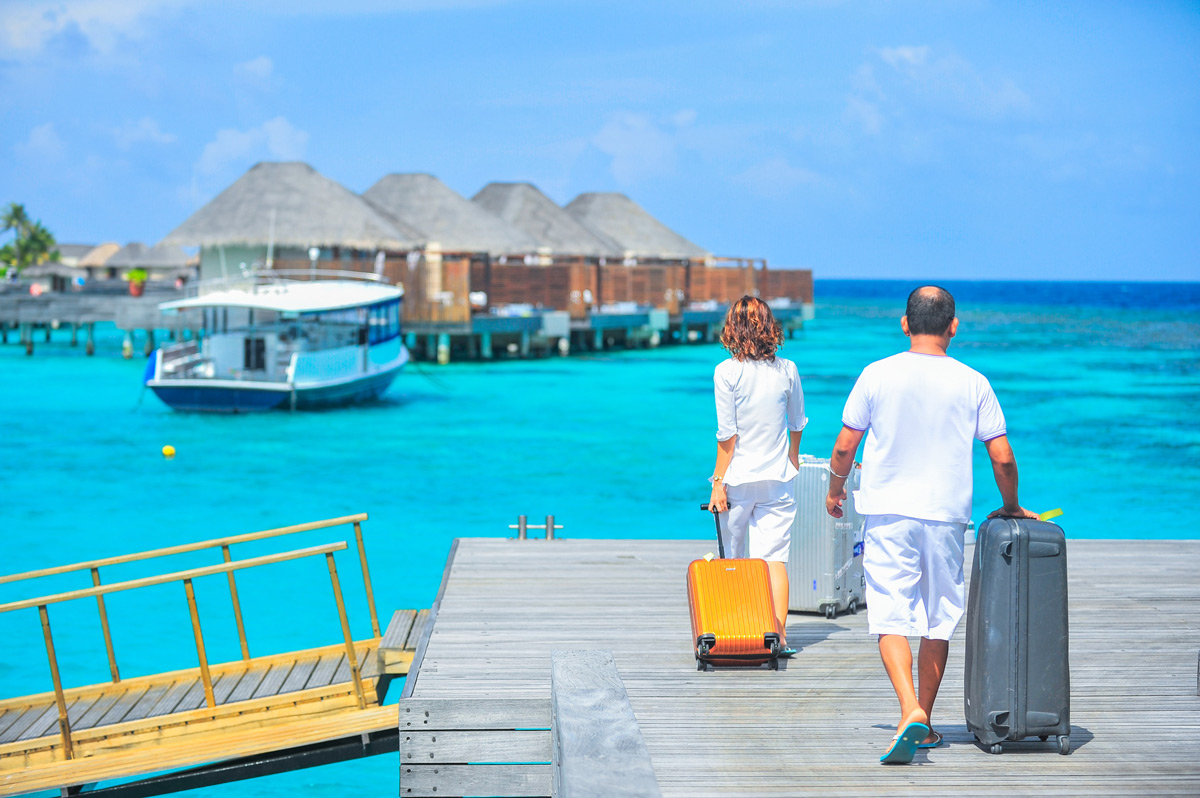From the bustling streets of Tokyo to the serene beaches of Bali, travelers are seeking out experiences that elevate their senses and ignite their curiosity. Travel is no longer just a journey; it’s an opportunity to explore one’s inner self, connect with the world, and make unforgettable memories along the way.
As the world becomes more connected, the urge to explore and discover new horizons has become an inherent part of the human experience. Interest in seeing new places has evolved to an artful pursuit of self-discovery and inspiration. With a world of possibilities at their fingertips, travelers are increasingly seeking out authentic and unique experiences that align with their passions and help them create cherished memories that will last a lifetime. For many, it’s become less about just getting away and more about bucket list travel experiences every time they leave their city.
Our team recently conducted extensive research on the state of travel today and how we expect it to impact the retail industry. Let’s dive into some of the themes we spotted, along with some opportunities for retailers.

Taking The Scenic Route
Opportunity for Retailers: Cater to the road trip crowd. Whether it’s road food, designer car organizers, or tech to improve the ride for drivers and passengers, opportunities to make the journey more pleasant abound.
The COVID-19 pandemic has changed the way we travel, with many people opting for road trips over air travel due to safety concerns and travel restrictions. As restrictions eased, travel came back with a vengeance in 2022, but that didn’t mean travelers solely returned to the air. In fact, a 2022 survey from The Vacationer found that nearly 80% of U.S. adults planned to take a road trip that summer. “Travel was closed due to COVID, and people don’t want to forfeit those experiences now,” said Mindi Trank, VP Strategy, Chute Gerdeman and ASG.
Even with the pandemic emergency behind us, there has been a growing number of travelers choosing to hit the road and take the scenic route, rather than flying, to their destination. Driving vacations offer a level of flexibility and freedom that air travel simply can’t match. With a car, travelers can stop whenever and wherever they want, take detours to explore off-the-beaten-path destinations, and truly immerse themselves in the landscapes and cultures they are passing through. Plus, there’s something about the open road that just feels liberating and adventurous.
“Travelers are driven by the idea of controlling their time and where they are going,” Trank said. “With auto travel, travelers have control over where they are going, and the stops along the journey have become more important than ever. People are making more opportunities for something special to happen.”

From cruising along coastal highways to winding through mountain passes, the scenery and terrain of a road trip can be just as exciting and awe-inspiring as the destination itself.
With the rise of electric and hybrid vehicles, road trips are becoming more sustainable and eco-friendly than ever before. With electric car charging stations popping up along major highways and eco-friendly accommodations catering to road-trippers, driving vacations are increasingly seen as a responsible and low-impact way to explore the world.
Checking off the Bucket List, One Trip at a Time
Opportunity for Retailers: Create opportunities for “meaningful” travel experiences and target the younger generations who want to make memories.
A Stanford Medicine research project asked participants to share what is on their bucket lists, a list of experiences, accomplishments, or goals that a person wants to achieve or fulfill before they die (also referred to as “kicking the bucket”). The top response? The desire to travel, with nearly 79% of participants stating they hoped to explore new places.
At root for many of these bucket list travels the quest for meaningful experiences. A poll conducted by Bucket List Travels, a travel inspiration website, found that participants fear the greatest regret at the end of their lives will be that they didn’t explore enough of the world.
More than half of those polled said they wanted to see at least five additional countries and are currently working on checking off their travel bucket list. These numbers were particularly high among single travelers and those in younger age groups who want to make memories, according to the survey.
“People are looking at their lives and deciding how they want to focus, and then they find where that could lead them,” Trank says.

Exploring Before Natural Wonders are Gone
Opportunity for Retailers: The eco-tourism bus has already left the station. But if you are not yet in the business, unfortunately for the planet, new opportunities for helping consumers explore endangered natural wonders are certain to continue to arise.
As concerns about climate change and other environmental issues continue to mount, more and more people are starting to travel to see places or things that may not be there down the road.
From melting glaciers and disappearing coral reefs to endangered animal species and landscapes threatened by rising sea levels, there are a growing number of natural wonders that are at risk of being lost forever.
The World Wildlife Fund (WWF) has found that some of the most iconic tourist destinations, including the Amazon rainforest, the Great Barrier Reef and the Galapagos Islands, are at high risk of being severely impacted by climate change in the coming decades.
This has led many travelers to prioritize destinations and experiences that may not be available when they finally get around to scheduling a trip.
“Climate tourism is starting to explode. It stems from that feeling that maybe I want to see the Great Salt Lake before it’s gone,” Trank said. “Along with travelers checking things off their bucket lists, we are getting a sense with COVID that we may not have all the time in the world. It brought to the forefront for us that every vacation has to count.”
While many travelers are seeking opportunities to explore these threatened landscapes, they are also learning about ways to help protect them.
“Even with small trips, more are carefully considering where they are going and becoming more conscious about the footprint they are leaving behind,” Trank said.
In fact, according to Booking.com’s 2022 Sustainable Travel report, nearly 66% of travelers want to have experiences that reflect local culture, 59% want to leave the places they visit better than when they first arrived, and nearly 50% said climate change news is influencing them to make more sustainable travel decisions.
These decisions may include choosing to stay in eco-lodges and supporting locally-owned businesses to using public transportation and reducing plastic waste. This shift toward sustainable tourism is not only good for the environment, but it can also benefit local communities and provide travelers with a more authentic and immersive experience.

Sit Back and Relax with Hassle-Free Organized Travel
Opportunities for Retailers: Savvy retailers will partner with organized travel companies to provide products for wellness, travel or leisure.
With the rise of organized travel, planning a dream getaway has never been more convenient or stress-free. In recent years, organized travel has become increasingly popular among vacationers seeking a hassle-free and enjoyable trip–even before the travel begins.
Theme-based tours, travel companies, and other forms of organized travel have made it easier than ever to plan and book a memorable vacation by taking care of all the details–from transportation and accommodations to activities and dining.
REI is one of several companies that has jumped into the travel planning business with its co-op adventure travel program that allows outdoor enthusiasts to explore some of the world’s most stunning landscapes. As a cooperative, REI is owned by its members, who are also its customers. This unique business model allows REI to offer travel options like hiking and backpacking trips, all led by experienced and knowledgeable guides.
“This is a retailer that has really jumped in with both feet,” Trank said. “They offer trips in so many ways. For example, REI may help a single traveler plan a hiking trip by recommending the right gear and offering a Saturday hiking training class to get in shape for the trip. On the trip, she can carry her daypack and REI sets up the rest. There are also other classes where people can plan them with their spouses or friends.”
Another popular immersion travel trip that is planned for the traveler and goes beyond traditional sightseeing is culinary tourism. One person’s trip may include sampling local foods, learning about traditional cooking techniques and taking pre-arranged cooking classes. Other types of trips where every detail is well thought-out before departure are wildlife safaris and wellness get-aways.

Going Back in Time with Heritage Travel
Opportunities for Retailers: By catering to this very personal niche, retailers can earn brand loyalty. Products that help document the journey, both physically and emotionally, will see demand. Personalized services in this area will continue to expand.
In recent years, there has been a significant resurgence of interest in heritage and culture among travelers. With the rise of DNA websites like 23andMe, more and more people are gaining insights into their ancestry and feeling a deeper connection to their roots. As a result, many travelers are now seeking out destinations that have personal significance to them and exploring their heritage in a more meaningful way.
A Global Wellness Institute study found that by this past year, heritage travel, which includes cultural and ancestral tourism, was expected to grow to $919 billion.
One way that travelers are engaging with their heritage is by visiting the places where their ancestors are from. Whether it’s tracing their family tree in Europe, exploring the villages of their forebears in Africa, or connecting with their Native American heritage in the Americas, travelers are seeking out experiences that help them better understand their cultural and historical roots.
By learning more about their heritage and culture, travelers are able to gain a deeper appreciation for their own identity and a greater understanding of the world around them.
Armchair Travel: Seeing the World without Leaving Your Home
Opportunities for Retailers: Not everyone is able to travel to the Eiffel Tower or the Great Wall of China. Find ways to bring the travel experience to consumers at home or closer to home.
While group tours are still popular among the aging population, the business model has changed to include what’s known as “armchair travel,” a term used to describe the experience of exploring the world without ever leaving the comfort of your home.
Armchair travel can take many forms, from reading travel books and watching travel documentaries to playing virtual reality games or taking virtual tours of famous landmarks and attractions.
“Older adults are staying closer to home, taking online classes and learning about new places,” Trank said. “Travel companies have shifted their models, making it easier to pay $300 for an online class that gives you the sense of going everywhere.”
This is one of the biggest advantages of armchair travel; it allows you to explore places that may be difficult or even impossible to visit in person. For example, you can visit the Pyramids of Giza in Egypt, the Great Wall of China or the Taj Mahal in India without ever leaving your living room. You can also explore the remote wilderness of Antarctica, the depths of the Amazon rainforest, or the vast expanses of the Sahara Desert without having to worry about safety or logistical challenges.
The State of Travel
Travel has had a major moment since COVID restrictions have lifted and people are ready to mingle and see the world. Having lived through a global pandemic, many Americans have a renewed desire to understand and explore new places and cultures. While our attitudes and priorities when it comes to travel has shifted, retailers have a massive opportunity to reach new audiences by finding where they could add value to travelers’ experiences.




